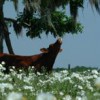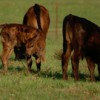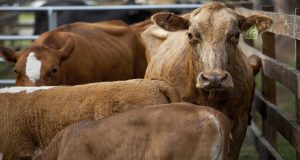As a cow ambles around and eats from the feed bunk, legions of other “animals” are feeding within the cow’s rumen. Billions of protozoa swim about in a single, 20-gallon rumen, colliding with one another while engulfing feed particles and bacteria. These microbes contribute vitally to rumen fermentation and have both positive and negative impacts on animal performance. This 4-page fact sheet discusses classification, activities, removal, and impacts of protozoa. Written by Timothy J. Hackmann, and published by the UF Department of Animal Sciences, January 2017.
http://edis.ifas.ufl.edu/an331
Tag: Beef Cattle Health
The Interaction of Nutrition and Health in Beef Cows
 In cattle, all physiological processes in the body, including the immune system, are influenced by the cattle’s nutritional status. Therefore, the past and present nutritional status serves as an immune function modulator in cattle that can influence the performance and reproduction of beef cattle. This 6-page fact sheet was written by Matt Hersom, and published by the UF Department of Animal Sciences, June 2014.
In cattle, all physiological processes in the body, including the immune system, are influenced by the cattle’s nutritional status. Therefore, the past and present nutritional status serves as an immune function modulator in cattle that can influence the performance and reproduction of beef cattle. This 6-page fact sheet was written by Matt Hersom, and published by the UF Department of Animal Sciences, June 2014.
http://edis.ifas.ufl.edu/an292
Does the Method of Castration Affect Calf Performance?
 This 4-page fact sheet discusses the purpose of castration in male calves as well as the different methods used to castrate. Most methods of castration cause a certain amount of pain and stress for calves, which can affect calf performance. UF/IFAS researchers recently tested different methods of castration in calves to determine the effects of each method on calf health and performance. This publication presents these results. Written by Trey Warnock, Matt Hersom, and Todd Thrift, and published by the UF Department of Animal Sciences, December 2013.
This 4-page fact sheet discusses the purpose of castration in male calves as well as the different methods used to castrate. Most methods of castration cause a certain amount of pain and stress for calves, which can affect calf performance. UF/IFAS researchers recently tested different methods of castration in calves to determine the effects of each method on calf health and performance. This publication presents these results. Written by Trey Warnock, Matt Hersom, and Todd Thrift, and published by the UF Department of Animal Sciences, December 2013.
http://edis.ifas.ufl.edu/an291
